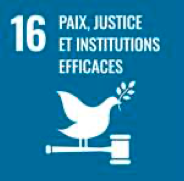Sociology
Find out more about sociology research at CNRS Humanities & Social Sciences and its laboratories.
Sociology researchers study the organisation and structuring of societies and the links between the individuals and groups that make them up. Sociologists are thus interested in a range of issues that can enhance our understanding of relationships between social groups or between individuals within societies, life paths, social initiatives (social involvement, work, etc.) or social groups, organisations and networks. Sociologists apply their observation methods and analytical frameworks to a wide range of social phenomena. Thus they may focus on subjects like social stratification and mobility, inequality, discrimination, socialisation, education, rural and urban life, health, the stages of life, disability, identity, gender, sexuality, mobilisation and collective action, mobility and migration, religion, law and justice, science, innovation and technology, culture, the media, fashion, professions or work. Any subject or issue that brings up questions about the relationship between individuals and society can in fact be studied from a sociological standpoint. The work of sociologists provides us with a better understanding of how societies function and change and can shed light on many of today's important issues.
Comparative approaches and the use of quantitative data alongside qualitative data are now taking on an increasingly important role in research projects which are themselves taking on an increasingly decisive role in many interdisciplinary projects.

Research centers and networks
CNRS Humanities & Social Sciences laboratories
- Centre Européen de Sociologie et de Science politique de la Sorbonne (CESSP)
- Centre d’étude des mouvements sociaux (CEMS)
- Centre d’Études et de Recherches Administratives, Politiques et Sociales (CERAPS)
- Centre de Recherche en Économie et Statistique (CREST)
- Centre d’études européennes et de politique comparée
- Centre de recherche médecine, sciences, santé, santé mentale, société (Cermes3)
- Centre de recherche sur les liens sociaux (CERLIS)
- Centre de Recherches Sociologiques et Politiques de Paris (CRESPPA)
- Centre de recherches sociologiques sur le droit et les institutions pénales (CESDIP)
- Centre de Recherches sur les Inégalités Sociales
- Centre Internet et Société (CIS)
- Centre lillois d’études et de recherches sociologiques et économiques (CLERSE)
- Centre Maurice Halbwachs
- Centre Max Weber
- Centre Méditerranéen de sociologie, de science politique et d’histoire (MESOPOLHIS)
- Centre nantais de sociologie (CENS)
- Droit, religion, entreprise et société (DRES)
- Groupe d’étude des méthodes de l’analyse sociologique de la Sorbonne (GEMASS)
- Institutions et Dynamiques Historiques de l’Économie et de la Société
- Laboratoire d’économie et de sociologie du travail (LEST)
- Laboratoire Interdisciplinaire d’Études sur les Réflexivités – Fonds Yann Thomas
- Laboratoire Interdisciplinaire Sciences, Innovations, Sociétés (LISIS)
- Laboratoire interdisciplinaire Solidarités, Sociétés, Territoires (LISST)
- Laboratoire Technique, Territoires et Sociétés (LATTS)
- Litt&Arts
- Unité de recherche migrations et société (URMIS)
Laboratories in other countries
- Centre d'études et de documentation juridique, économique et sociale (CEDEJ)
- Centre d'études français sur la Chine contemporaine (CEFC)
- Centre d’études franco-russe (CEFR)
- Centre français de recherche de la péninsule arabique (CEFREPA (ancien CEFAS))
- Centre français de recherche en sciences sociales (CEFRES)
- Centre d'études mexicaines et centraméricaines (CEMCA)
- Centre Jacques-Berque pour les études en sciences humaines et sociales (CESHS)
- Centre français d'études éthiopiennes (CFEE)
- Centre Marc Bloch - Centre franco-allemand de recherches en Sciences Sociales (CMB)
- Centre de recherche français de Jérusalem (CRFJ)
- Centre des sciences humaines (CSH)
- Epigenetics, data, politics (Epigenetics, data, politics) (EpiDaPo)
- Environnement, Santé, Société (ESS)
- Institut français d'Afrique du Sud (IFAS)
- Institut français d'études anatoliennes- G. Dumezil (IFEA)
- Institut français d'études andines (IFEA)
- Institut français d'études sur l'Asie centrale (IFEAC)
- Institut français de Pondichéry (IFP)
- Institut français du Proche-Orient (IFPO)
- Institut français de recherche en Afrique - Ibadan (IFRA Nigéria)
- Institut français de recherche en Afrique - Nairobi (IFRA Nairobi)
- Institut français de recherche en Iran (IFRI)
- Institut français de recherche sur le Japon à la Maison franco-japonaise (IFRJ-MFJ)
- Interdisciplinary and Global Environmental Studies (iGLOBES)
- Institut de recherche sur l'Asie du Sud-Est contemporaine (IRASEC)
- Institut de recherche sur le Maghreb contemporain (IRMC)
- Maison française d'Oxford (MFO)
- Section française de la direction des antiquités et des musées nationaux du Soudan (SFDAS)
Chaire de professeur junior
- CNRS Sciences humaines & sociales a proposé une chaire de professeur junior sur les « Inégalités éducatives : mesures dans le temps long et expérimentations situées et à grande échelle (InEducaME) » en 2023. Cette chaire a débouché sur le recrutement d’un agent, affecté au Centre Max Weber à compter de 2024.
Innovation and outreach
- Science/society :
The CNRS takes part in the Institute for Studies and Research on Law and Justice (IERDJ), a public interest grouping (GIP). This institute succeeded both the MRDJ (Law and Justice Research Mission) jointly set up by the French Ministry of Justice and the CNRS in 1994 to construct a research corpus dedicated to law and justice and also the IHEJ (Institute for Advanced Studies on Justice), an association created by the National School for the Judiciary (ENM) in 1990 to provide a think tank for thought on judicial practices. Over the last three decades, over five hundred collective and multidisciplinary research projects have been conducted under the auspices of the MRDJ while the IHEJ's work has produced varied focus groups and publications on pioneering themes.
CNRS Humanities & Social Sciences post-doctorate
The InSHS provides financing for a post-doctorate position dedicated to the "role of European law in public health and the development of medicines". This post is located at the DICE (International, Comparative and European Law) joint research unit and is attached to a Junior Professor's Chair at Aix-Marseille University.
Networks
SOSI - Suivi ouvert des sociétés et de leurs interactions
- Dispositif d’Étude et de Mesure des Attitudes et des Inégalités au sein des Nouvelles générations (DEMAIN)